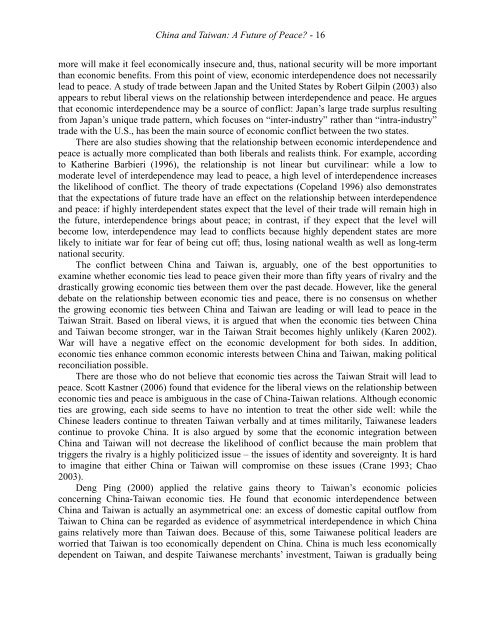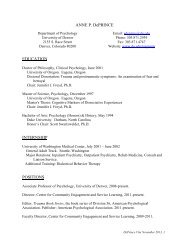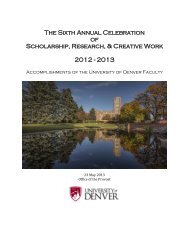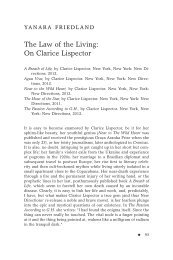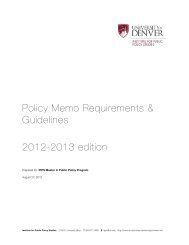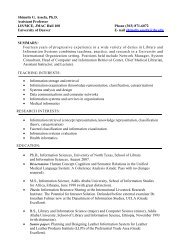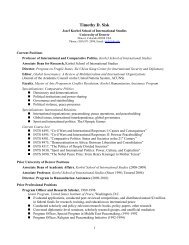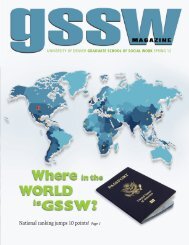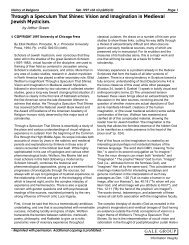Chien-Kai Chen, “China and Taiwan: A Future of Peace? A Study of ...
Chien-Kai Chen, “China and Taiwan: A Future of Peace? A Study of ...
Chien-Kai Chen, “China and Taiwan: A Future of Peace? A Study of ...
You also want an ePaper? Increase the reach of your titles
YUMPU automatically turns print PDFs into web optimized ePapers that Google loves.
China <strong>and</strong> <strong>Taiwan</strong>: A <strong>Future</strong> <strong>of</strong> <strong>Peace</strong>? - 16<br />
more will make it feel economically insecure <strong>and</strong>, thus, national security will be more important<br />
than economic benefits. From this point <strong>of</strong> view, economic interdependence does not necessarily<br />
lead to peace. A study <strong>of</strong> trade between Japan <strong>and</strong> the United States by Robert Gilpin (2003) also<br />
appears to rebut liberal views on the relationship between interdependence <strong>and</strong> peace. He argues<br />
that economic interdependence may be a source <strong>of</strong> conflict: Japan’s large trade surplus resulting<br />
from Japan’s unique trade pattern, which focuses on “inter-industry” rather than “intra-industry”<br />
trade with the U.S., has been the main source <strong>of</strong> economic conflict between the two states.<br />
There are also studies showing that the relationship between economic interdependence <strong>and</strong><br />
peace is actually more complicated than both liberals <strong>and</strong> realists think. For example, according<br />
to Katherine Barbieri (1996), the relationship is not linear but curvilinear: while a low to<br />
moderate level <strong>of</strong> interdependence may lead to peace, a high level <strong>of</strong> interdependence increases<br />
the likelihood <strong>of</strong> conflict. The theory <strong>of</strong> trade expectations (Copel<strong>and</strong> 1996) also demonstrates<br />
that the expectations <strong>of</strong> future trade have an effect on the relationship between interdependence<br />
<strong>and</strong> peace: if highly interdependent states expect that the level <strong>of</strong> their trade will remain high in<br />
the future, interdependence brings about peace; in contrast, if they expect that the level will<br />
become low, interdependence may lead to conflicts because highly dependent states are more<br />
likely to initiate war for fear <strong>of</strong> being cut <strong>of</strong>f; thus, losing national wealth as well as long-term<br />
national security.<br />
The conflict between China <strong>and</strong> <strong>Taiwan</strong> is, arguably, one <strong>of</strong> the best opportunities to<br />
examine whether economic ties lead to peace given their more than fifty years <strong>of</strong> rivalry <strong>and</strong> the<br />
drastically growing economic ties between them over the past decade. However, like the general<br />
debate on the relationship between economic ties <strong>and</strong> peace, there is no consensus on whether<br />
the growing economic ties between China <strong>and</strong> <strong>Taiwan</strong> are leading or will lead to peace in the<br />
<strong>Taiwan</strong> Strait. Based on liberal views, it is argued that when the economic ties between China<br />
<strong>and</strong> <strong>Taiwan</strong> become stronger, war in the <strong>Taiwan</strong> Strait becomes highly unlikely (Karen 2002).<br />
War will have a negative effect on the economic development for both sides. In addition,<br />
economic ties enhance common economic interests between China <strong>and</strong> <strong>Taiwan</strong>, making political<br />
reconciliation possible.<br />
There are those who do not believe that economic ties across the <strong>Taiwan</strong> Strait will lead to<br />
peace. Scott Kastner (2006) found that evidence for the liberal views on the relationship between<br />
economic ties <strong>and</strong> peace is ambiguous in the case <strong>of</strong> China-<strong>Taiwan</strong> relations. Although economic<br />
ties are growing, each side seems to have no intention to treat the other side well: while the<br />
Chinese leaders continue to threaten <strong>Taiwan</strong> verbally <strong>and</strong> at times militarily, <strong>Taiwan</strong>ese leaders<br />
continue to provoke China. It is also argued by some that the economic integration between<br />
China <strong>and</strong> <strong>Taiwan</strong> will not decrease the likelihood <strong>of</strong> conflict because the main problem that<br />
triggers the rivalry is a highly politicized issue – the issues <strong>of</strong> identity <strong>and</strong> sovereignty. It is hard<br />
to imagine that either China or <strong>Taiwan</strong> will compromise on these issues (Crane 1993; Chao<br />
2003).<br />
Deng Ping (2000) applied the relative gains theory to <strong>Taiwan</strong>’s economic policies<br />
concerning China-<strong>Taiwan</strong> economic ties. He found that economic interdependence between<br />
China <strong>and</strong> <strong>Taiwan</strong> is actually an asymmetrical one: an excess <strong>of</strong> domestic capital outflow from<br />
<strong>Taiwan</strong> to China can be regarded as evidence <strong>of</strong> asymmetrical interdependence in which China<br />
gains relatively more than <strong>Taiwan</strong> does. Because <strong>of</strong> this, some <strong>Taiwan</strong>ese political leaders are<br />
worried that <strong>Taiwan</strong> is too economically dependent on China. China is much less economically<br />
dependent on <strong>Taiwan</strong>, <strong>and</strong> despite <strong>Taiwan</strong>ese merchants’ investment, <strong>Taiwan</strong> is gradually being


